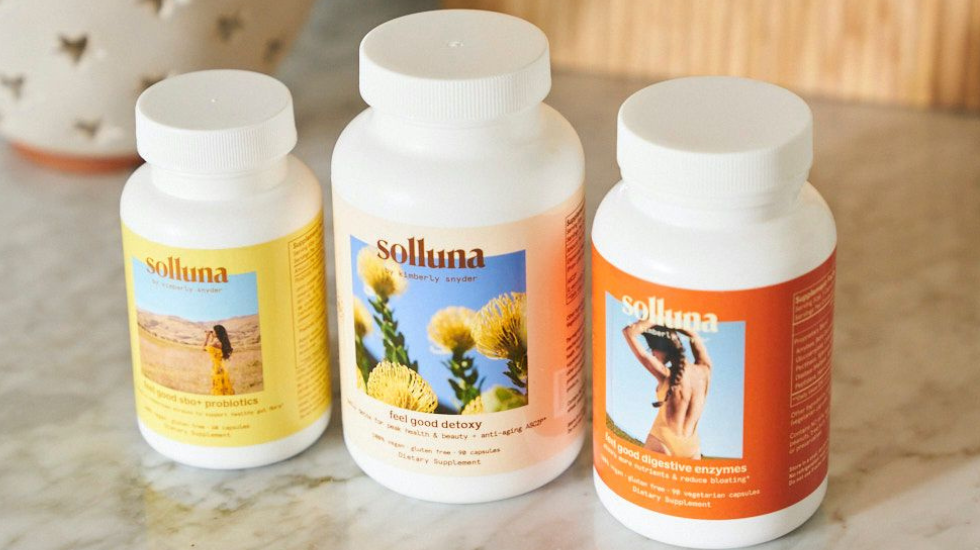If you’ve ever stood in the supplement aisle (or scrolled through endless options online) wondering what digestive supplement is actually worth, this is for you!
With thousands of options claiming to support gut health, ease bloating, and boost digestion, where do you even start? Do you really need one? And if so, how do you know which one is right for you?
I hear these questions all the time from our community, and I totally get it! Your gut health is deeply personal, and what works for one person might not be the best choice for another.
That’s exactly why I’ve created a complete guide to digestive supplements—so you can cut through the confusion and find exactly what your body needs to feel its best!
In all of these sections, I’ve linked additional articles I’ve written so you can actually get a more comprehensive look at what your body needs and (hopefully) answer all of your questions!
Why Digestive Supplements Matter
Your digestive system is the foundation of your overall health—when it’s thriving, you feel energized, vibrant, and balanced. But when things feel off, bloating, sluggish digestion, discomfort, and even low energy can creep in.
Digestive supplements are powerful tools designed to support your body’s natural ability to break down and absorb nutrients, keeping your gut happy and your whole body in balance.
So many of us struggle with digestion today. Modern diets are packed with processed foods, stress is at an all-time high, and our gut microbiomes are less diverse than ever before. Even the healthiest eaters can experience digestive imbalances!
Who Can Benefit from Digestive Supplements?
Anyone Living in Today’s World: With rising levels of toxins, chemicals, and environmental pollutants, our digestive systems are working harder than ever to process what we consume. Microplastics, pesticides, and food additives can all impact gut health. Enzymes and probiotics help give your body the extra support it needs to function optimally.
Plant-Based Eaters: A fiber-rich diet is amazing for gut health, but breaking down all that fiber efficiently requires a strong digestive system. Probiotics and enzymes can help!
Anyone Struggling with Bloating & Discomfort: If you feel heavy or gassy after meals, digestive enzymes, and probiotics may be the missing piece to restoring balance.
Those on Restrictive Diets: Whether you’re following keto, paleo, gluten-free, or another specific diet, digestive supplements help ensure you’re properly breaking down and absorbing the nutrients you need!
Aging Adults: As we get older, our natural enzyme production slows down, making digestion and nutrient absorption more difficult—leading to potential deficiencies.
Do You Really Need Digestive Supplements?
You might be thinking, “Do I really need to take supplements for digestion?”
And listen, I get it. I’m not here to tell you that you need a dozen different pills every day. In fact, I’m the opposite of that! I believe in simplicity when it comes to supplementation. But here’s the reality:
Our modern lifestyles have completely changed the way our digestive systems function.
- We’re exposed to more processed foods than ever before, even when we try to eat clean.
- Stress levels are at an all-time high, and stress directly impacts digestion.
- Our gut microbiomes are less diverse than ever due to everything from antibiotics to over-sanitization.
Your gut isn’t just responsible for digestion.
It plays a huge role in things you might not even associate with gut health, like:
- Skin health – Breakouts, dullness, or irritation? Your gut influences how your skin detoxifies.
- Mood and mental clarity—Your gut produces up to 90% of your serotonin! If your digestion is off, your mood and focus can be, too.
- Immunity – Nearly 70% of your immune system is in your gut, meaning a healthy microbiome helps keep you resilient.
- Food sensitivities & bloating – This is the big one! If you’re constantly dealing with discomfort, irregular digestion, or bloating, it could be a sign your gut is struggling.
So, do I think everyone needs to take 10+ supplements a day? Absolutely not.
But do I believe there are two core digestive supplements that just about everyone can benefit from?
Absolutely!
But with so many options out there, where do you even begin? Let’s digest the details!
Probiotics: The Foundation of Gut Health
If digestion is a journey, then probiotics are like the trusted guides that help everything move smoothly along the way!
Probiotics are the beneficial bacteria that live in your gut, working behind the scenes to support digestion, immunity, and even your mood.
The key is choosing the right strains for your unique needs, looking at CFU count (colony-forming units), and ensuring shelf stability.
Learn More: How to Choose a Probiotic Supplement
What About Prebiotics & Postbiotics?
It’s not just about probiotics—your gut is home to an entire ecosystem of beneficial compounds that work together.
Prebiotics: The “food” for probiotics. Found in high-fiber foods like bananas, onions, and garlic, prebiotics fuel beneficial gut bacteria so they can thrive.
Postbiotics: The beneficial byproducts that probiotics produce. These compounds support gut barrier function, immunity, and even skin health!
Balancing all three—prebiotics, probiotics, and postbiotics—creates a truly thriving microbiome.
Learn More: Prebiotic vs. Probiotic vs. Postbiotic – What’s the Difference?
Do I Need a Probiotic if I Have Enough Fiber?
If you follow a plant-based diet, you’re already giving your gut a major boost with fiber-rich foods! Fiber, especially prebiotic fiber, is what feeds the beneficial bacteria in your gut, helping them grow and multiply. Without enough fiber, even the best probiotics won’t be able to do their job properly.
But there’s a balance—eating lots of fiber without enough good bacteria to break it down can actually lead to bloating and discomfort. This is why so many plant-based eaters struggle with digestion, even when they’re eating nourishing whole foods!
Pairing fiber with the right probiotics helps create harmony in your gut,
Learn More: Probiotics and Fiber: Why You Need Both for Better Health
What About Soil-Based Probiotics?
Above all, look for probiotics that will actually survive the journey to your gut! So many probiotics don’t even make it through your digestive process!
Soil-based probiotics (SBOs) are my personal go-to because they’re naturally resilient and don’t require refrigeration—meaning they actually survive the journey to your gut, where they can work their magic!
Learn More: Why Choose Soil-Based Probiotics? What You Need to Know
Why I Rely on Feel Good SBO Probiotics for Daily Gut Support
If your probiotics need to be refrigerated just to survive on a store shelf, how can they possibly make it through your digestive system and into your gut?
This is exactly why I rely so heavily on Feel Good SBO Probiotics—they’re naturally resilient, just like the probiotics our ancestors got from the soil. As I said, soil-based organisms (SBOs) are designed by nature to make it all the way to your gut!
But survival is just the beginning! Our Feel Good SBO Probiotics go beyond just gut health, offering:
- Prebiotics + Probiotics + Postbiotics for a complete microbiome boost
- Support for digestion, immune function, and even mood balance
- Humic acid and shilajit extract to enhance nutrient absorption
- Dairy-free, plant-based strains that align with a vegan lifestyle
Probiotics are essential for a balanced gut, but not all are created equal. If you’re looking for a modern-day solution that works with your body, not against it, I can’t recommend these enough!
Using Digestive Enzymes to Break Down Your Food
Eating a nourishing, fiber-rich diet is amazing for your body, but if you’re not breaking down and absorbing those nutrients properly, you’re not getting the full benefits! That’s where digestive enzymes come in.
Digestive enzymes are proteins your body naturally produces to break down fats, proteins, and carbohydrates so they can be properly absorbed. However, factors like stress, aging, and gut imbalances can slow down enzyme production, making digestion less efficient.
Learn More: What Are Digestive Enzymes? (And How They Help Your Whole Body!)
A good digestive enzyme supplement should include a broad-spectrum formula with key enzymes like:
- Lipase (for breaking down fats)
- Protease (for breaking down proteins)
- Amylase (for breaking down carbohydrates)
How to Choose the Right Digestive Enzyme Supplement
Not all digestive enzyme supplements are created equal, and with so many options on the market, it’s important to know what to look for to truly support your digestion.
A high-quality digestive enzyme supplement should include a broad-spectrum formula with key enzymes that target different macronutrients:
Lipase: Helps break down fats so your body can absorb essential fatty acids.
Protease: Assists in digesting proteins into smaller peptides and amino acids for easier absorption.
Amylase: Supports the breakdown of carbohydrates into usable energy.
While having the right blend of enzymes is key, the quality of the ingredients is just as important. Many supplements out there are packed with fillers, binders, and artificial additives—things your body simply doesn’t need!
Instead of truly supporting digestion, these extras can actually make it harder for your body to function at its best!
Learn More: How to Choose the Right Digestive Enzyme Supplement for You
How Digestive Enzymes Support a Healthy Metabolism
Your metabolism isn’t just about burning calories; it’s about how efficiently your body breaks down and absorbs nutrients. Digestive enzymes play a crucial role in this process by helping your system convert food into usable energy. If your digestion feels sluggish, your metabolism might be, too!
Learn More: How to Support Your Metabolism with Digestive Enzymes
How Long Does It Take for Digestive Enzymes to Work?
Everyone’s body is unique, so the way you experience digestive enzymes can vary! Some people notice relief from bloating and improved digestion within hours, while for others, it may take a few days for their system to fully adjust. Factors like your diet, gut health, and the specific enzymes you’re taking all play a role in how quickly you’ll feel the benefits. Be patient and consistent—your body will thank you!
Learn More: How Long Does It Take For Digestive Enzymes to Work?
Why Thousands Swear by These Digestive Enzymes
Thousands of Solluna community members have found that Feel Good Digestive Enzymes are an absolute lifesaver when it comes to breaking down all that amazing fiber and healthy fats.
Here’s what makes them so special:
- Extra support for fiber-rich diets – Hard-working cellulase and xylanase help break down tough plant fibers so you can absorb more nutrients and experience better digestion.
- 2-3x more fat-busting lipase – This means you’re actually absorbing your beauty fats rather than storing them as body fat.
- More energy, better digestion, and improved clarity – Because when your body isn’t working overtime to digest food, you feel lighter, clearer, and more vibrant.
Try them for yourself and feel the difference!
How to Build the Digestive Supplement Routine for You
Finding the right digestive supplement routine is all about supporting your body’s natural rhythms and giving your gut exactly what it needs to function optimally.
One thing to keep in mind: your gut microbiome is as unique as you are!
No two people have the same balance of gut bacteria. Your microbiome is shaped by everything from your genetics and immune system to your diet, stress levels, and even where you live.
This is why a personalized approach is so important! When you listen to your body and provide it with what it truly needs, you create the best possible environment for digestion, absorption, and overall well-being.
Should You Take Probiotics and Digestive Enzymes Together?
Yes! While probiotics and enzymes serve different roles, they work beautifully together to create a healthy, balanced digestive system.
Probiotics replenish the good bacteria in your gut, supporting long-term digestion, immunity, and overall gut health.
Digestive enzymes help break down food efficiently in the moment, making it easier for your body to absorb nutrients.
By combining them, you’re nourishing your gut on two levels by helping both the microbiome and the digestive process itself!
When Should You Take Them for Best Results?
Timing matters when it comes to digestive support!
- Probiotics are best taken first thing in the morning on an empty stomach to help the good bacteria establish in your gut before digestion starts for the day.
- Digestive enzymes should be taken with meals to help break down food as you eat, reducing bloating and maximizing nutrient absorption.
Listen to Your Body, Support Your Gut
At the end of the day, the best digestive supplement routine is the one that works for you.
Your gut is constantly communicating with you—whether through bloating, energy levels, or how you feel after meals.
So listen!
Supporting your gut with probiotics and digestive enzymes is a simple, effective way to start feeling better every single day. When your digestion thrives, so does everything else—your energy, skin, mood, and overall well-being!
By nourishing your gut, you’re not just improving digestion; you’re creating a foundation for vibrant health, inside and out.
With extra gut love,









0 Comments